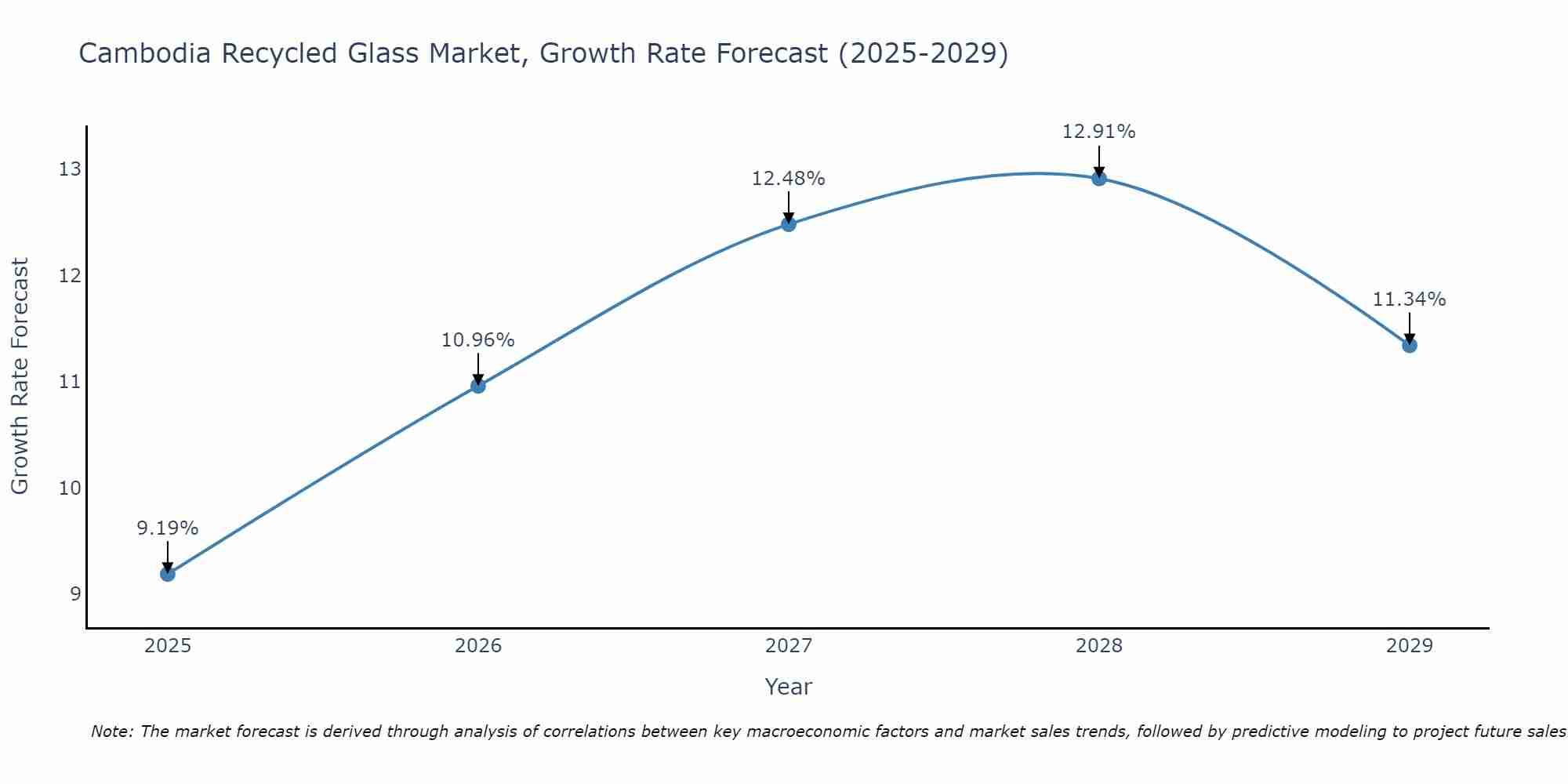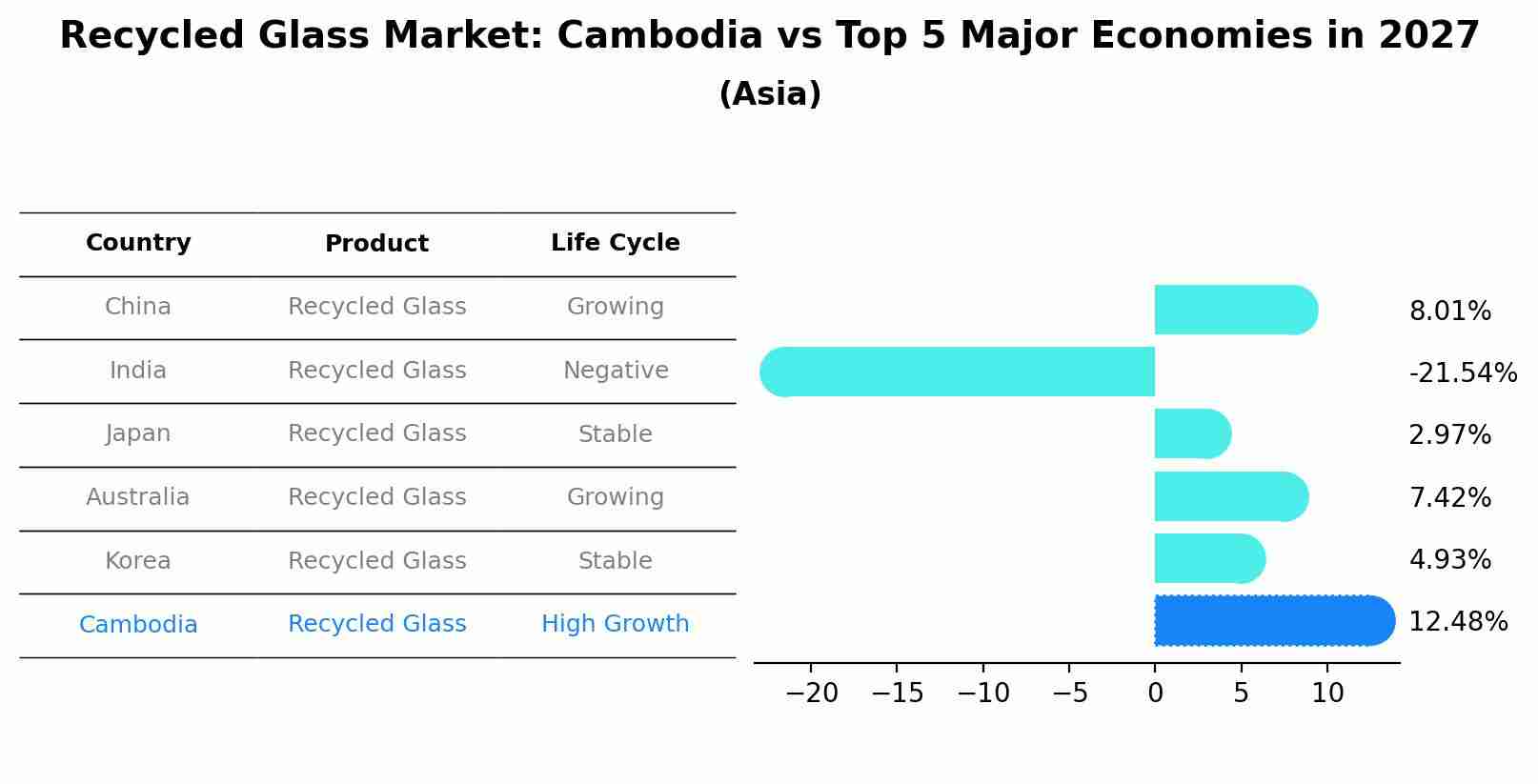Cambodia Recycled Glass Market (2025-2031) Outlook | Forecast, Industry, Companies, Analysis, Size, Growth, Share, Trends, Value & Revenue
| Product Code: ETC355713 | Publication Date: Aug 2022 | Updated Date: Aug 2025 | Product Type: Market Research Report | |
| Publisher: 6Wresearch | Author: Summon Dutta | No. of Pages: 75 | No. of Figures: 35 | No. of Tables: 20 |
Cambodia Recycled Glass Market Size Growth Rate
The Cambodia Recycled Glass Market is projected to witness mixed growth rate patterns during 2025 to 2029. The growth rate begins at 9.19% in 2025, climbs to a high of 12.91% in 2028, and moderates to 11.34% by 2029.

Recycled Glass Market: Cambodia vs Top 5 Major Economies in 2027 (Asia)
Cambodia's Recycled Glass market is anticipated to experience a high growth rate of 12.48% by 2027, reflecting trends observed in the largest economy China, followed by India, Japan, Australia and South Korea.

Cambodia Recycled Glass Market Synopsis
The Cambodia Recycled Glass Market is experiencing steady growth due to increasing awareness about environmental sustainability and the benefits of using recycled materials. The market is driven by the rising demand for eco-friendly products in various industries, including construction, food and beverage, and packaging. Recycled glass products are gaining popularity among consumers for their aesthetic appeal and durability. Key players in the market are focusing on product innovation and expanding their product portfolios to cater to diverse customer needs. Government initiatives promoting recycling and sustainable practices are further supporting the growth of the recycled glass market in Cambodia. Overall, the market is expected to continue to expand as more businesses and consumers prioritize sustainability in their purchasing decisions.
Cambodia Recycled Glass Market Trends
The Cambodia recycled glass market is experiencing a growing trend towards sustainable and eco-friendly products. Consumers are increasingly seeking out recycled glass products as a more environmentally friendly alternative to traditional glassware. This trend is driven by a rising awareness of the environmental impact of waste and a growing interest in supporting local artisans and businesses. Additionally, government initiatives promoting recycling and sustainability are further boosting the demand for recycled glass products in Cambodia. As a result, manufacturers and retailers are expanding their offerings of recycled glass items, including tableware, home decor, and packaging materials, to cater to this emerging market trend.
Cambodia Recycled Glass Market Challenges
In the Cambodia Recycled Glass Market, some challenges include limited consumer awareness and demand for recycled glass products, insufficient infrastructure for collection and recycling processes, and competition from cheaper alternative materials. Additionally, the lack of formal regulations and standards for recycled glass production and usage poses a challenge in ensuring product quality and safety for consumers. Limited access to technology and funding for modernizing recycling facilities also hinders the growth of the recycled glass market in Cambodia. Addressing these challenges will require collaborations among government agencies, industry stakeholders, and consumer education initiatives to promote the benefits of recycled glass products and support sustainable practices in the market.
Cambodia Recycled Glass Market Investment Opportunities
The Cambodia Recycled Glass Market presents promising investment opportunities due to the increasing demand for sustainable and eco-friendly products in the country. With growing awareness about environmental conservation and the government`s initiatives to promote recycling, there is a rising interest in recycled glass products. Investors can explore opportunities in setting up or partnering with recycling facilities to process glass waste into new products such as glassware, construction materials, or decorative items. Additionally, there is potential for exporting recycled glass products to international markets, leveraging Cambodia`s competitive labor costs. Investing in the Cambodia Recycled Glass Market not only aligns with sustainable practices but also offers the potential for profitability in a growing market segment.
Jordan Agar Market Government Policies
The Cambodian government has implemented various policies to support the recycled glass market in the country. These policies include the promotion of recycling initiatives through education and awareness campaigns, providing incentives such as tax breaks or subsidies for businesses engaged in glass recycling, and establishing regulations to encourage the use of recycled glass in construction and manufacturing processes. Additionally, the government has collaborated with industry stakeholders to develop recycling infrastructure and improve collection and processing systems to increase the efficiency and sustainability of the recycled glass market. Overall, these policies aim to reduce waste, promote environmental sustainability, and support the growth of the recycled glass industry in Cambodia.
Cambodia Recycled Glass Market Future Outlook
The future outlook for the Cambodia Recycled Glass Market appears promising, driven by increasing environmental awareness and the growing trend towards sustainable practices. With the government`s initiatives to promote recycling and reduce waste, coupled with the rising demand for eco-friendly products, the market is poised for steady growth. Additionally, the construction industry`s shift towards using recycled glass in building materials and decorative elements further boosts market prospects. The availability of raw materials and the development of efficient recycling processes also contribute to the market`s positive outlook. Overall, the Cambodia Recycled Glass Market is expected to expand as consumers and industries embrace the benefits of sustainable and recycled products.
Key Highlights of the Report:
- Cambodia Recycled Glass Market Outlook
- Market Size of Cambodia Recycled Glass Market, 2024
- Forecast of Cambodia Recycled Glass Market, 2031
- Historical Data and Forecast of Cambodia Recycled Glass Revenues & Volume for the Period 2021 - 2031
- Cambodia Recycled Glass Market Trend Evolution
- Cambodia Recycled Glass Market Drivers and Challenges
- Cambodia Recycled Glass Price Trends
- Cambodia Recycled Glass Porter's Five Forces
- Cambodia Recycled Glass Industry Life Cycle
- Historical Data and Forecast of Cambodia Recycled Glass Market Revenues & Volume By Product for the Period 2021 - 2031
- Historical Data and Forecast of Cambodia Recycled Glass Market Revenues & Volume By Crushed Glass for the Period 2021 - 2031
- Historical Data and Forecast of Cambodia Recycled Glass Market Revenues & Volume By Cullets for the Period 2021 - 2031
- Historical Data and Forecast of Cambodia Recycled Glass Market Revenues & Volume By Glass Powder for the Period 2021 - 2031
- Historical Data and Forecast of Cambodia Recycled Glass Market Revenues & Volume By Application for the Period 2021 - 2031
- Historical Data and Forecast of Cambodia Recycled Glass Market Revenues & Volume By Glass Bottle & Containers for the Period 2021 - 2031
- Historical Data and Forecast of Cambodia Recycled Glass Market Revenues & Volume By Flat Glass for the Period 2021 - 2031
- Historical Data and Forecast of Cambodia Recycled Glass Market Revenues & Volume By Fiber Glass for the Period 2021 - 2031
- Historical Data and Forecast of Cambodia Recycled Glass Market Revenues & Volume By Highway Beads for the Period 2021 - 2031
- Historical Data and Forecast of Cambodia Recycled Glass Market Revenues & Volume By Abrasives for the Period 2021 - 2031
- Historical Data and Forecast of Cambodia Recycled Glass Market Revenues & Volume By Fillers for the Period 2021 - 2031
- Historical Data and Forecast of Cambodia Recycled Glass Market Revenues & Volume By Others for the Period 2021 - 2031
- Cambodia Recycled Glass Import Export Trade Statistics
- Market Opportunity Assessment By Product
- Market Opportunity Assessment By Application
- Cambodia Recycled Glass Top Companies Market Share
- Cambodia Recycled Glass Competitive Benchmarking By Technical and Operational Parameters
- Cambodia Recycled Glass Company Profiles
- Cambodia Recycled Glass Key Strategic Recommendations
Frequently Asked Questions About the Market Study (FAQs):
- Single User License$ 1,995
- Department License$ 2,400
- Site License$ 3,120
- Global License$ 3,795
Search
Related Reports
- ASEAN and Thailand Brain Health Supplements Market (2025-2031) | Strategy, Consumer Insights, Analysis, Investment Trends, Opportunities, Growth, Size, Share, Industry, Revenue, Segments, Value, Segmentation, Supply, Forecast, Restraints, Outlook, Competition, Drivers, Trends, Demand, Pricing Analysis, Competitive, Strategic Insights, Companies, Challenges
- ASEAN Bearings Market (2025-2031) | Strategy, Consumer Insights, Analysis, Investment Trends, Opportunities, Growth, Size, Share, Industry, Revenue, Segments, Value, Segmentation, Supply, Forecast, Restraints, Outlook, Competition, Drivers, Trends, Demand, Pricing Analysis, Competitive, Strategic Insights, Companies, Challenges
- Europe Flooring Market (2025-2031) | Outlook, Share, Industry, Trends, Forecast, Companies, Revenue, Size, Analysis, Growth & Value
- Saudi Arabia Manlift Market (2025-2031) | Outlook, Size, Growth, Trends, Companies, Industry, Revenue, Value, Share, Forecast & Analysis
- Uganda Excavator, Crane, and Wheel Loaders Market (2025-2031) | Strategy, Consumer Insights, Analysis, Investment Trends, Opportunities, Growth, Size, Share, Industry, Revenue, Segments, Value, Segmentation, Supply, Forecast, Restraints, Outlook, Competition, Drivers, Trends, Demand, Pricing Analysis, Competitive, Strategic Insights, Companies, Challenges
- Rwanda Excavator, Crane, and Wheel Loaders Market (2025-2031) | Strategy, Consumer Insights, Analysis, Investment Trends, Opportunities, Growth, Size, Share, Industry, Revenue, Segments, Value, Segmentation, Supply, Forecast, Restraints, Outlook, Competition, Drivers, Trends, Demand, Pricing Analysis, Competitive, Strategic Insights, Companies, Challenges
- Kenya Excavator, Crane, and Wheel Loaders Market (2025-2031) | Strategy, Consumer Insights, Analysis, Investment Trends, Opportunities, Growth, Size, Share, Industry, Revenue, Segments, Value, Segmentation, Supply, Forecast, Restraints, Outlook, Competition, Drivers, Trends, Demand, Pricing Analysis, Competitive, Strategic Insights, Companies, Challenges
- Angola Excavator, Crane, and Wheel Loaders Market (2025-2031) | Strategy, Consumer Insights, Analysis, Investment Trends, Opportunities, Growth, Size, Share, Industry, Revenue, Segments, Value, Segmentation, Supply, Forecast, Restraints, Outlook, Competition, Drivers, Trends, Demand, Pricing Analysis, Competitive, Strategic Insights, Companies, Challenges
- Israel Intelligent Transport System Market (2025-2031) | Strategy, Consumer Insights, Analysis, Investment Trends, Opportunities, Growth, Size, Share, Industry, Revenue, Segments, Value, Segmentation, Supply, Forecast, Restraints, Outlook, Competition, Drivers, Trends, Demand, Pricing Analysis, Competitive, Strategic Insights, Companies, Challenges
- Uganda Precast and Aggregate Market (2025-2031) | Strategy, Consumer Insights, Analysis, Investment Trends, Opportunities, Growth, Size, Share, Industry, Revenue, Segments, Value, Segmentation, Supply, Forecast, Restraints, Outlook, Competition, Drivers, Trends, Demand, Pricing Analysis, Competitive, Strategic Insights, Companies, Challenges
Industry Events and Analyst Meet
Our Clients
Whitepaper
- Middle East & Africa Commercial Security Market Click here to view more.
- Middle East & Africa Fire Safety Systems & Equipment Market Click here to view more.
- GCC Drone Market Click here to view more.
- Middle East Lighting Fixture Market Click here to view more.
- GCC Physical & Perimeter Security Market Click here to view more.
6WResearch In News
- Doha a strategic location for EV manufacturing hub: IPA Qatar
- Demand for luxury TVs surging in the GCC, says Samsung
- Empowering Growth: The Thriving Journey of Bangladesh’s Cable Industry
- Demand for luxury TVs surging in the GCC, says Samsung
- Video call with a traditional healer? Once unthinkable, it’s now common in South Africa
- Intelligent Buildings To Smooth GCC’s Path To Net Zero













